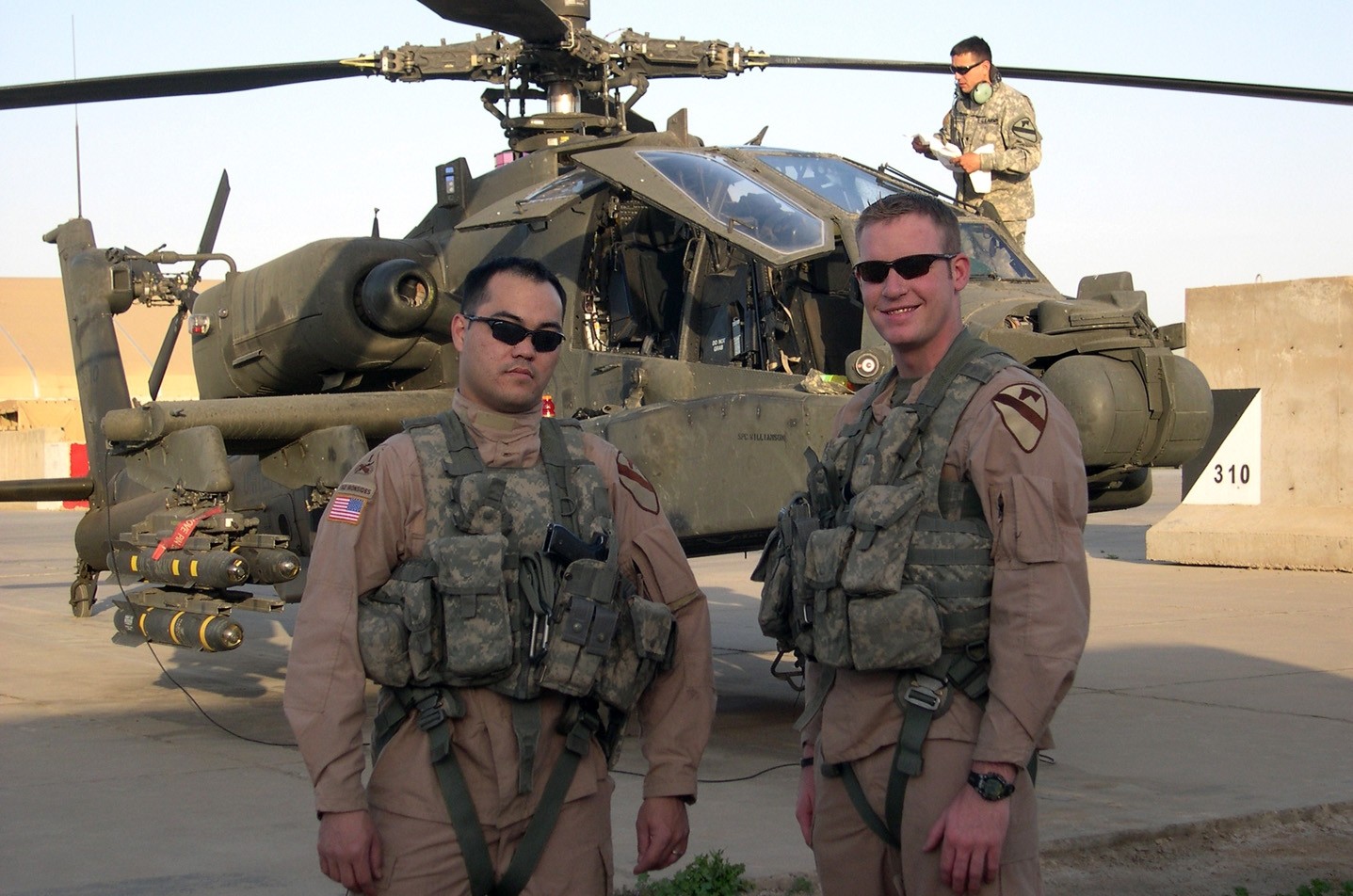CAMP TAJI, Iraq - When Zachary Johnson and Eric Dillman first met seven years ago at a selection board for Army pilot candidates, they had no idea they would spend the first decade of their Army careers in tandem.
"I took a look at him there and thought: 'He'll never get picked up,'" said Johnson, a native of Palouse, Wash. "He was looking at me going: 'Man, he'll never get picked up.'"
Two months later, Johnson and Dillman - now chief warrant officers three and AH-64D Apache pilots with the 1st Air Cavalry Brigade - were headed to Basic Training at Fort Jackson, S.C., in the Army's High School to Flight School Program.
Coincidentally, they were in the same platoon at Basic. From there, it seemed less like coincidence and more like fate. The two were roommates at flight school and then stationed together in the 1st Battalion, 501st Aviation Regiment, in Germany and in Company B, 4th "Guns" Battalion, 227th Aviation Regiment, 1st ACB, 1st Cavalry Division.
They also have deployed together to Iraq twice and will both go to Fort Rucker, Ala., after they redeploy, to be instructor pilots.
While it would seem that being stationed together for so many years could cause some friction, they said they can sense when it's best to give each other some space.
"We usually leave each other alone; we can tell when the other is agitated," said Dillman, a native of Olympia, Wash.
They have reached a level of communication where they often finish each other's sentences. That's an asset for pilots on the same team who sometimes have to make split-second decisions that affect their sister aircraft.
"We can go out there, and we'll probably talk a lot less than a lot of other teams do," Dillman said. "That's a good thing and a bad thing in itself."
"The bad thing being that if you do get new people - we know what we're going to do without even talking about it, and the (other pilots) can be left out of the loop," Johnson added.
Their closeness has also led them to progress more quickly in their careers than they may have had they been flying solo.
"There was always competition between friends to make you sharper," Johnson said. "We always challenge each other - rip on each other when we do something stupid. When it's coming from a friend, you can take it a little more lightheartedly."
The two said they cherish the friendships they have made on their current deployment, and talked about the low point of the deployment.
"We suffered a loss in the company early on in the deployment," said Dillman. "That was definitely the low point for the company. You could just tell how everybody changed."
That incident happened in Najaf in January, when 4-227th Attack Reconnaissance Battalion lost two pilots - Capt. Mark Resh and Chief Warrant Officer 3 Cornell Chao. Johnson's actions during the firefight were highlighted during a press briefing by Lt. Gen. Raymond Odierno, the Mult-National Corps-Iraq commanding general.
"I want to pause and recognize one of our heroes, Chief Warrant Officer 2 Zachary Johnson," Odierno said during the Pentagon press briefing in April. "You might remember earlier in the year that extremists attempted to seize the city of Najaf and kill several of the major clerics within Iraq. The Iraqi army fought valiantly and called for air support from Coalition Forces.
"Among them was Chief Johnson, who led his crew to attack and destroy enemy air defense systems despite the risks of daytime operations. Disregarding his own safety during this action where a fellow Apache crew had already been shot down, he expended all of his ammunition on enemy positions. He then flew back, rearmed and immediately rejoined the fight. His undaunted courage in the hostile skies north of Najaf contributed to the success of the Iraqi security forces and Multi-National Division-Baghdad that day. The complexity of this mission demanded the highest level of leadership as well as technical and tactical skill, which he delivered for all his fellow Soldiers and teammates."
The two have watched each other's backs since day one, but Johnson joked that he has more incentive to watch over his buddy now, since Dillman got married about two years ago.
"It's a professional thing; you do it because that's your job," Johnson said. "We're friends with everybody in the company; I don't want to see anybody ever get hurt. It makes it a little more personal. I know his wife would kill me if something happened to him."
But it was Dillman watching out for Johnson in July, disregarding his own safety to swoop in and retrieve Johnson and his fellow pilot when their Apache was forced to land during a mission in Baghdad. The two recovered pilots rode back to Camp Taji on the wings of Dillman's Apache.
Dillman said he would do the same thing for any of the pilots in his company - whom he considers his brothers - but the fact that it was his daughter's godfather and his own best friend made it even more personal.
"I guess that's one of those things where, you would do it for any pilot, but, because it was him, I was a little more eager to get down there and get him."
Besides, what fun would Fort Rucker be for Dillman without his wingman'


Social Sharing